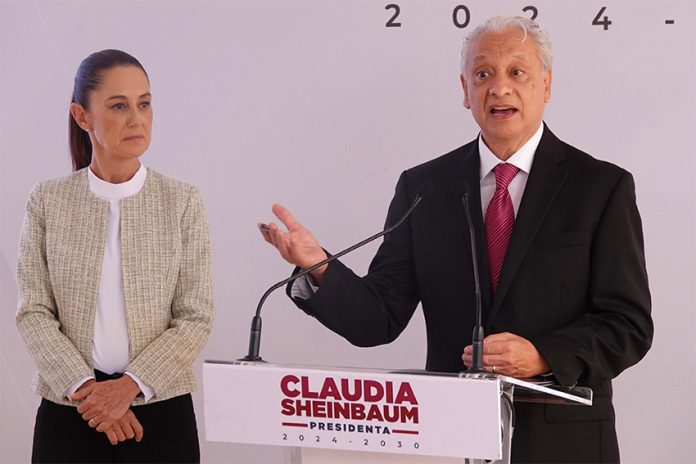President-elect Claudia Sheinbaum announced Monday that energy economist and engineering academic Víctor Rodríguez Padilla will be the next CEO of Pemex, Mexico’s heavily-indebted state oil company.
Sheinbaum, who will take office Oct. 1, announced the appointment at a press conference in Mexico City.

Besides being “an expert in energy economics and policy,” Sheinbaum said that Rodríguez “… has 42 years of experience in the energy sector and of course he’s been a defender of the energy companies of the nation, of energy sovereignty.”
“… Víctor knows Pemex,” she said after noting that she and the next state oil company CEO have co-authored various academic and newspaper articles about Mexico’s energy sector.
Who is Víctor Rodríguez, the next CEO of Pemex?
Rodríguez, a professor of engineering at the National Autonomous University (UNAM), will succeed Octavio Romero, who has led the state oil company throughout the six-year term of President Andrés Manuel López Obrador.
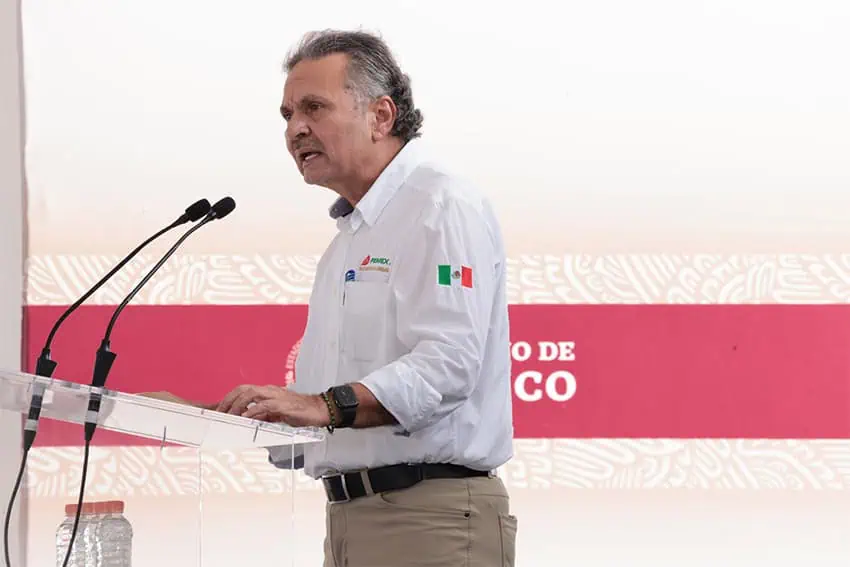
He will take the reins of a company with debt of almost US $100 billion, making Pemex — an oil driller and refiner — the world’s most indebted oil firm.
The Bloomberg news agency reported that Sheinbaum tapped Rodríguez for the position “to boost Pemex’s profitability and rescue the company from ballooning debt and recurring accidents as she seeks to jump start Mexico’s green energy transition.”
The president-elect has committed to continuing support for Pemex, which has received enormous financial assistance from the current government.
However, she has also pledged to invest billions of dollars in renewable energy projects.
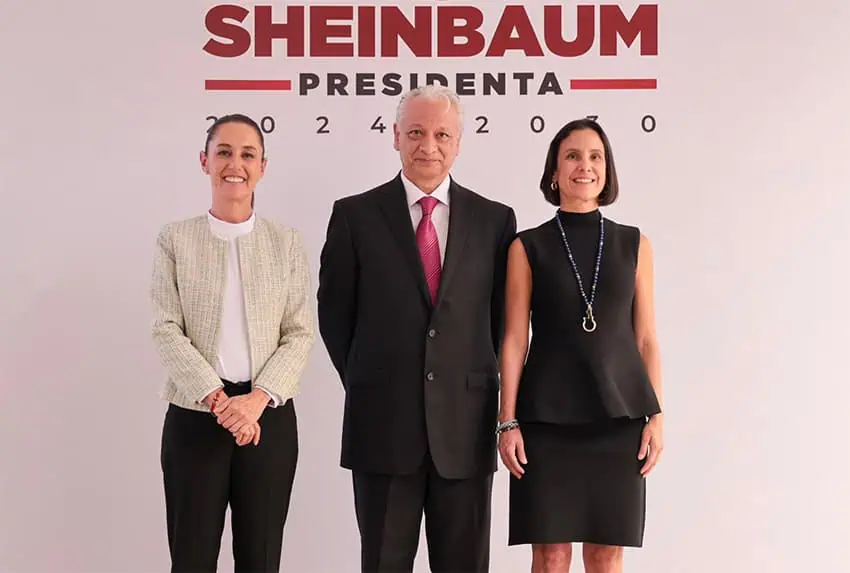
In a speech after Sheinbaum announced his appointment, Rodríguez said it was an “honor” to be given “the great opportunity” to lead “the country’s biggest company,” but also “a challenge” and a “great responsibility.”
Despite its large debt, Rodríguez asserted that the current government “has rescued” Pemex over the past six years.
“Petróleos Mexicanos was devastated with the neoliberal policies that were implemented during this whole period of six six-year terms of government,” he said, referring to the period between 1982 and 2018.
“They handed over a devastated company, a company in ruins with refineries falling to pieces,” Rodríguez said.
“Fortunately, [the refineries] have been restored and we’re in the process of increasing their capacity,” he said.
“… We’ve limited [fuel] imports and we’re close to reaching self-sufficiency. It’s been a very big effort in terms of the rescue of this company,” said Rodríguez, who will be responsible for seven Pemex refineries in Mexico, including the new one on the Tabasco coast, as well as the state oil company’s refinery in Texas.
He later declared that “Pemex is not a dead company,” nor is it as bad off as people think.
“The media exaggerates a little bit or a lot,” Rodríguez said before conceding that the company faces a “financial situation” that the government is attempting to resolve. He pledged to work closely on that issue with incoming energy minister Luz Elena González Escobar and Finance Minister Rogelio Ramírez de la O, who will stay in the same position after Sheinbaum takes office.
Pemex, he subsequently asserted, has been “very responsible” in paying back what it owes.

In terms of the “punctuality” of payments, the company’s conduct has been “impeccable,” Rodríguez said.
“Some rating agencies haven’t recognized that. Not all of them — some have and some haven’t,” he said.
Pemex’s oil production target
Rodríguez said that “a significant challenge” for Pemex will be to “maintain” crude production at 1.8 million barrels per day (bpd) in order to have enough oil to supply the state oil company’s refineries.
Production is currently less than half what it was 20 years ago, falling to around 1.5 million bpd from more than 3 million bpd in 2004.
Rodríguez attributed the decline to “geological maturity [of oil fields], lack of investment, carelessness, negligence and a cunning plan to privatize the company” during the so-called neoliberal period.
Pemex will play a ‘fundamental role’ in energy transition
“It’s important to highlight the Pemex of the future,” Rodríguez told reporters. “What are we going to do?”
The soon-to-be Pemex CEO said that the vast majority of energy used in Mexico — almost 90% — comes from fossil fuels: “basically gas, which is the main energy source we use in the country, and oil.”
“We need to maintain the base of energy supply in the economy … while we carry out the energy transition,” Rodríguez said.
Renewable sources will satisfy increasing demand for energy, he said, adding that the incoming government will make a “big effort” to develop those sources.
“Pemex will play a fundamental role. Pemex won’t limit itself to making oil and gas condensate as it has always done,” Rodríguez said.
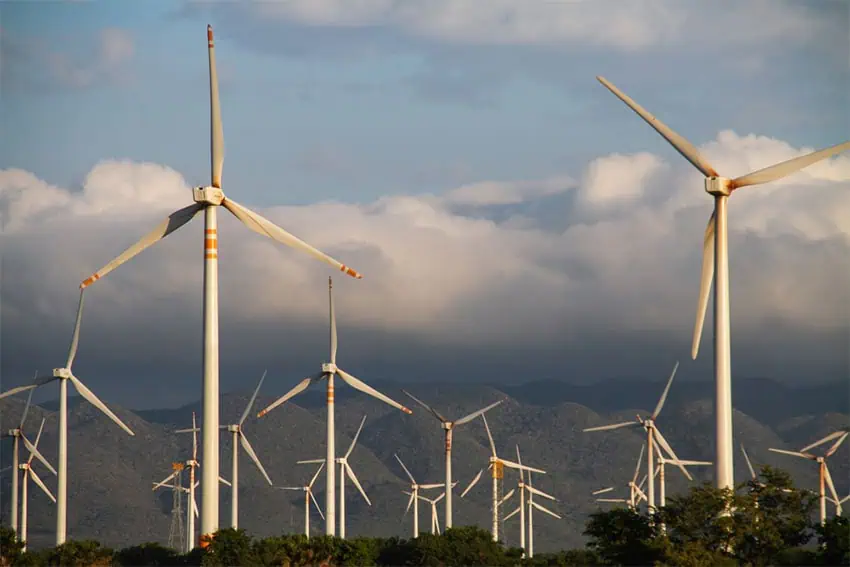
“Now we’re going to do new projects. We’re going to have partnerships with society, with universities, with business people, to do the projects of the future. We’re going to produce wind energy, solar energy, offshore wind energy. We’re going to produce strategic materials including lithium,” he said.
Rodolfo Ramos, head of Mexico research at the Brazilian financial services company Bradesco, said that Rodríguez’s willingness to partner with the private sector could help the bottom line of Pemex, which recorded its worst loss in four years last quarter.
Damian Fraser, CEO of Mexico City-based business consultancy Miranda Partners, said on LinkedIn that “Rodriguez Padilla has been given one of the most difficult jobs in Mexico — CEO of Pemex, the heavily indebted, loss-making state-owned oil and refining company.”
“A respected professor in energy engineering at the UNAM, he has limited administrative experience. Still, he at least enjoys a close relationship with incoming President Claudia Sheinbaum, with whom he has co-authored several academic papers,” he wrote.
The new CEO’s CV
Sheinbaum, a physicist and climate scientist before entering politics, said Monday that she has known Rodríguez “for many years.”
“We have the same degree, … he also studied physics in the Faculty of Sciences at UNAM,” she said.
Sheinbaum also noted that Rodríguez has a master’s degree in energy engineering from UNAM and a PhD in energy economics from the Grenoble Alps University in France.
In addition, he has completed postdoctoral studies in France and Canada.
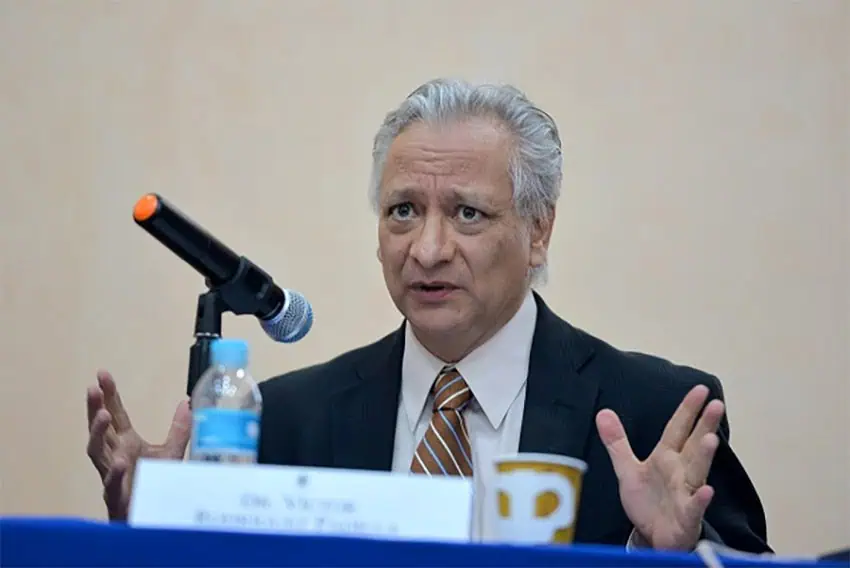
Sheinbaum highlighted that Rodríguez is currently a professor in UNAM’s postgraduate engineering program and a member of the National System of Researchers. She also noted that he has been an advisor to both houses of Congress, the Federal Auditor’s Office, the Supreme Court and other government departments.
In addition, Rodríguez has worked as a consultant for the United Nations Economic Commission for Latin America and the Caribbean, the Latin American Energy Organization, Oxfam and the Climate Initiative of Mexico.
“He’s a founding member of an organization that I was in some time ago as well,” Sheinbaum said, referring to the Observatorio Ciudadano de la Energía, or Citizens Energy Observatory.
“We always fought for the defense of the public organizations of Pemex and the Federal Electricity Commission, and against privatization,” she said.
Sheinbaum said that current Pemex CEO Octavio Romero will continue to work with the government, but didn’t specify the area. The business news website El CEO reported Friday that he will head up the national housing fund Infonavit during the next six-year period of government.
With reports from El Financiero, Reforma and Bloomberg
